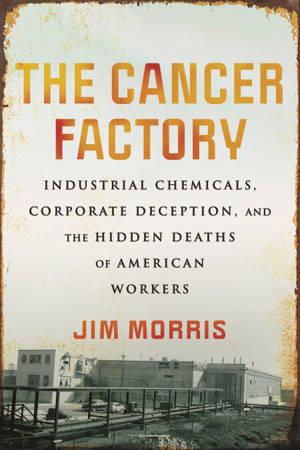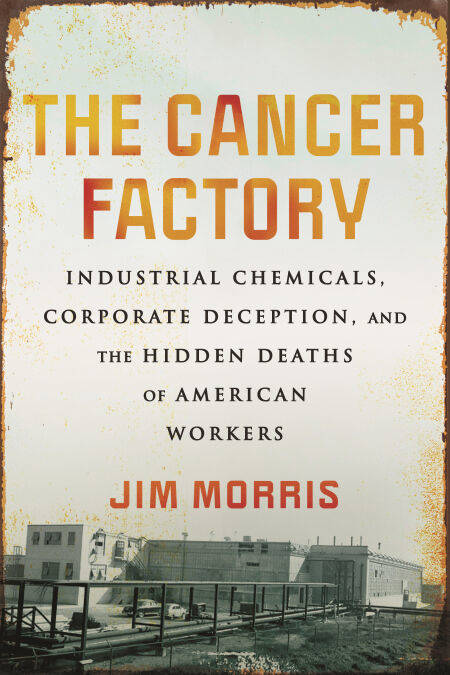
- Retrait gratuit dans votre magasin Club
- 7.000.000 titres dans notre catalogue
- Payer en toute sécurité
- Toujours un magasin près de chez vous
- Retrait gratuit dans votre magasin Club
- 7.000.0000 titres dans notre catalogue
- Payer en toute sécurité
- Toujours un magasin près de chez vous
The Cancer Factory EBOOK
Industrial Chemicals, Corporate Deception, and the Hidden Deaths of American Workers
Jim Morris
Ebook | Anglais
12,80 €
+ 12 points
Format
Description
“No journalist knows more about toxic chemicals in the workplace than Jim Morris. The Cancer Factory is the crowning achievement of his estimable career spent walking fence lines, factory floors, and doctor’s offices.”
—Dan Fagin, author of the Pulitzer Prize–winning Toms River
“The Cancer Factory could not come at a better time, as we reckon with how our bodies pay the price for our nation’s toxic history and as today’s workers fight not for only their rights but for their very lives.… A powerful and essential read.”
—Anna Clark, author of The Poisoned City
The story of a group of Goodyear Tire and Rubber workers fatally exposed to toxic chemicals, the lawyer who sought justice on their behalf, and the shameful lack of protection our society affords all workers
Working at the Goodyear Tire and Rubber Company chemical plant in Niagara Falls, New York, was considered a good job. It was the kind of industrial manufacturing job that allowed blue-collar workers to thrive in the latter half of the 20th century—that allowed them to buy their own home, and maybe a small boat for the lake.
But it was also the kind of job that exposed you to toxic chemicals and offered little to no protection from them, either in the way of protective gear or adequate ventilation. Eventually, it was a job that gave you bladder cancer.
The Cancer Factory tells the story of the workers who experienced one of the nation’s worst, and best-documented, outbreaks of work-related cancer, and the lawyer who has represented the bladder-cancer victims at the plant for more than 30 years. Goodyear, and its chemical supplier, DuPont, knew that two of the chemicals used in the plant had been shown to cause cancer, but made little effort to protect the plant’s workers until the cluster of cancer cases—and deaths—was undeniable.
In doing so it tells a broader story of corporate malfeasance and governmental neglect. Workers have only weak protections from exposure to toxic substances in America, and regulatory breaches contribute to an estimated 95,000 deaths from occupational illness each year. Based on 4 decades of reporting and delving deeply into the scientific literature about toxic substances and health risks, the arcana of worker regulations, and reality of loose enforcement, The Cancer Factory exposes the terrible health risks too many workers face.
—Dan Fagin, author of the Pulitzer Prize–winning Toms River
“The Cancer Factory could not come at a better time, as we reckon with how our bodies pay the price for our nation’s toxic history and as today’s workers fight not for only their rights but for their very lives.… A powerful and essential read.”
—Anna Clark, author of The Poisoned City
The story of a group of Goodyear Tire and Rubber workers fatally exposed to toxic chemicals, the lawyer who sought justice on their behalf, and the shameful lack of protection our society affords all workers
Working at the Goodyear Tire and Rubber Company chemical plant in Niagara Falls, New York, was considered a good job. It was the kind of industrial manufacturing job that allowed blue-collar workers to thrive in the latter half of the 20th century—that allowed them to buy their own home, and maybe a small boat for the lake.
But it was also the kind of job that exposed you to toxic chemicals and offered little to no protection from them, either in the way of protective gear or adequate ventilation. Eventually, it was a job that gave you bladder cancer.
The Cancer Factory tells the story of the workers who experienced one of the nation’s worst, and best-documented, outbreaks of work-related cancer, and the lawyer who has represented the bladder-cancer victims at the plant for more than 30 years. Goodyear, and its chemical supplier, DuPont, knew that two of the chemicals used in the plant had been shown to cause cancer, but made little effort to protect the plant’s workers until the cluster of cancer cases—and deaths—was undeniable.
In doing so it tells a broader story of corporate malfeasance and governmental neglect. Workers have only weak protections from exposure to toxic substances in America, and regulatory breaches contribute to an estimated 95,000 deaths from occupational illness each year. Based on 4 decades of reporting and delving deeply into the scientific literature about toxic substances and health risks, the arcana of worker regulations, and reality of loose enforcement, The Cancer Factory exposes the terrible health risks too many workers face.
Spécifications
Parties prenantes
- Auteur(s) :
- Editeur:
Contenu
- Nombre de pages :
- 264
- Langue:
- Anglais
Caractéristiques
- EAN:
- 9780807059159
- Date de parution :
- 22-01-24
- Format:
- Ebook
- Protection digitale:
- Adobe DRM
- Format numérique:
- ePub

Les avis
Nous publions uniquement les avis qui respectent les conditions requises. Consultez nos conditions pour les avis.






